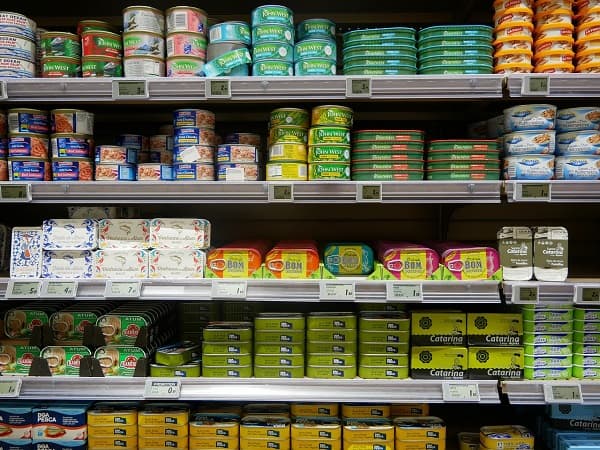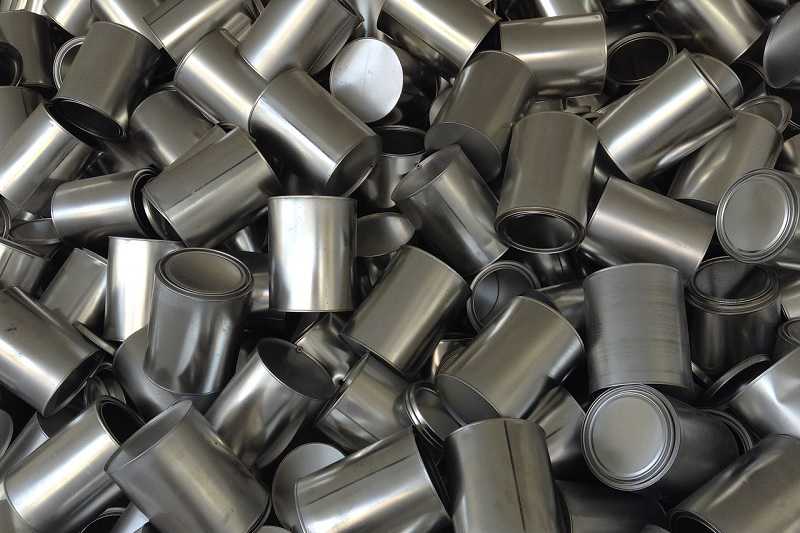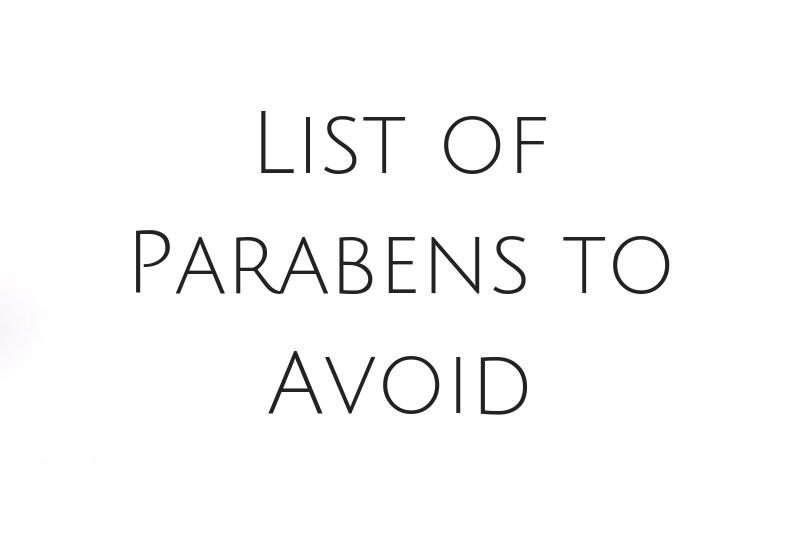BPA (bisphenol-A) is a chemical often found in plastics, but lesser known is the fact that it can be found in a range of other objects, including tin cans.
Widely used in plastic food packaging, BPA, also known as bisphenol-A, is also used in food and drinks cans as a sealant.
Metal cans may corrode over time, and this is obviously a problem when they are used to store food or drinks for long periods.
To prevent food contamination by rust and bacteria, the inside of cans are coated in a waterproof epoxy resin that prevents wet foods from coming into direct content with the metal can and degrading it.
But BPA leaches into foods and is then consumed by an unsuspecting public.
Is BPA Banned from Use in Cans?
BPA is considered safe to be used in food packaging by the European Food Safety Authority (EFSA) and UK Food Standards Agency (FSA), whose recommendations follow from the EFSA.
There is no law or regulation to prevent manufacturers from using BPA in cans or any other food packaging in Europe, although consumer pressure is gradually causing companies to rethink their BPA use.
Regulating agencies like the EFSA in Europe and the FDA in America have ruled that BPA poses no health threat when used at approved levels.
To exceed the FDA’s current recommended limit, the average person would have to consume “4 cans of cream of mushroom soup, or over 64 cans of green beans per day, or over nine cans of turkey gravy per day,” according to a Michigan State University blog.
On the other hand, the Environmental Working Group (EWG) claims that significant numbers of cans tested exceeded set standards.
Health Risks of BPA
A range of health organisations and many members of the public are concerned about scientific research which suggests that the hormone-disrupting properties of BPA can cause serious endocrine disruption and lead to significant health issues.
According to Breast Cancer UK, diet is the main cause of exposure to BPA, and the organisation is calling for it to be removed from all food packaging.
The European Chemicals Agency (ECHA) has classed BPA as an endocrine disruptor and “substance of very high concern,” in contrast to EFSA rulings.
Research suggests that BPA mimics the hormone oestrogen in the body, throwing the endocrine system out of balance and contributing to breast cancer, prostate cancer, obesity, heart disease, diabetes, infertility and reproductive issues and damage to DNA.
It is now estimated to be present in between 93-99.5% of the population and has been detected in human sweat, urine, breast milk and other body tissues and fluids.

Which Cans Contain BPA?
In 2015, a study by the Environmental Working Group (EWG) found that most major brands in the U.S. were continuing to use BPA in their canned packaging.
In a survey of 252 brands, most used BPA in the packaging for one or more of their canned goods. Only 12% used BPA-free packaging for their entire range of canned goods. 43% gave ambiguous answers or failed to reply to EWG’s queries.
“If you go to a store and buy a can, it is likely to have BPA,” said EWG Research Director Renee Sharp.
With EFSA and the FDA in agreement over the safety of BPA in food packaging, there is no reason to think that the story is different in Britain.
In 2010, The Independent newspaper surveyed the manufacturers of the UK’s most popular tinned foods and found that BPA was used in 18 out of 20 products. But how much progress has been made since then?
A 2016 report by a group of non-profit U.S. organisations, including the Breast Cancer Fund, Ecology Centre and others, tested 200 cans of food and found that two-thirds contained BPA.
Breast Cancer UK responded to the study by writing to the UK subsidiaries of many of these food giants, including Campbell’s – all of whose cans that were tested contained BPA – for information about their use of the chemical.
While Campbell’s declared that it would remove BPA from its packaging by 2017, it has not provided any public update about its progress in this goal.
According to the Can Manufacturers Institute (CMI), however, most food cans no longer contain BPA.
Robert Budway, president of the CMI, has said that the institute conducted a survey and estimated that 90% have replaced BPA with other plastics including polyester and nylon:
“This percentage is increasing because when consumers made clear their preference to move away from BPA, the industry was eager to respond and committed to the research and testing necessary to find high-performing alternatives.
Continual research is helping the industry innovate and find new options,” Budway told Packaging Digest.
Other best-selling brands in UK supermarkets are at various stages in dealing with public health concerns over BPA. Heinz tweeted in January 2018 that it is at an “advanced stage of completing the move to alternatives” and that most of its cans no longer contain BPA.
Tinned fish brand John West has some “tinned products [that] are lined with a lacquer that contains a derivate of Bisphenol.
By contact, tiny amounts of Bisphenol A are able to migrate but are within the EU regulation limits (under 600µg/kg).”
The brand claims on its website that, “Even though we are challenging our can suppliers for total removal of bisphenol, no appropriate substitute component is currently available that does the same job.”
How Can You Find Out if a Can Contains BPA?
To find out whether your favourite tinned food and drinks are exposed to BPA, it should be as simple as getting in touch with the specific brand that concerns you. Unfortunately, though, there may actually be more to the story.
While some brands have switched to a BPA alternative for some products, the unfortunate reality is that the alternatives may be just as bad or even more harmful than the original.
The University of California found that BPS, a substitute for BPA, disrupts the reproductive system. Another study found that six alternatives were more potent in their endocrine disrupting properties than BPA.
Perhaps the biggest problem regarding BPA and other food and packaging information is the lack of transparency in the industry.
Few brands are willing to label their tins with a list of what materials and chemicals are contained within; until we get concrete labelling, companies will be able to include a whole variety of undeclared substances that are then consumed by the unwitting customer.
Reducing Your Exposure to BPA
The best way of reducing your dietary dose of BPA and similar chemicals is to minimize your consumption of processed and packaged foods, choosing as many fresh, whole and organic options as possible.

Naturaler is a UK website full of tips and recommendations for living a more eco-friendly, chemical-free and natural lifestyle.




Pingback: My journey towards a Plastic Free future – part 6 | Yet another blogging mummy!!!
There is a company called SUMA in UK who pride themselves on being a leading brand of organic canned foods in UK but a unknown percentage of their cans are lined with bisphenol A. What is the point of creating organic food only to put the food into bisphenol A lined cans. Its ludicrous. Its the strategies of the lunatic asylum devoid of all logic. I advise all prospective customers of SUMA to think again before purchasing SUMA canned foods as it renders organic useless. Dino Carlucci